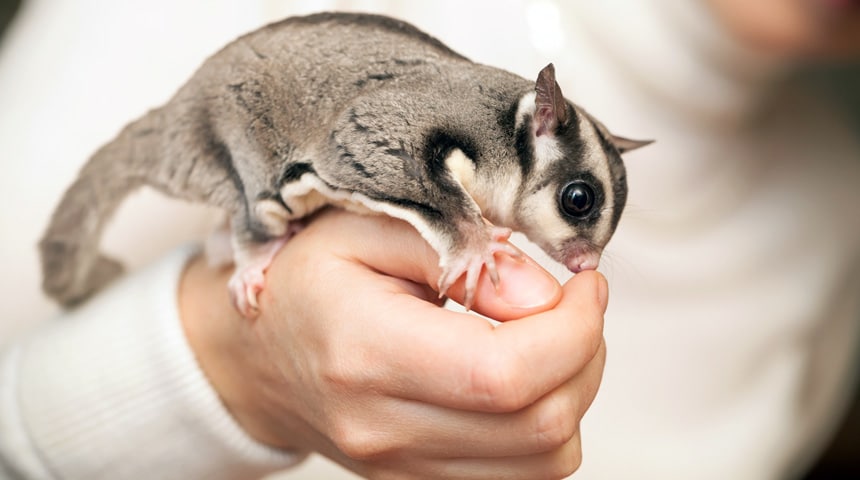
Sugar gliders are nocturnal arboreal marsupials. They are omnivorous ; in the wild, they eat sap and gum from eucalyptus and acacia trees, nectar and pollen, and a large variety of insects and arachnids. It would be difficult to reproduce this diet in captivity, and it would not, in any case, be recommended. Wild sugar gliders eat up to 17% of their weight daily and use up this calorie intake through their daily activities. In captivity, a lighter diet is recommended to suit the inferior activity level of our domestic companions. To this day, no commercial sugar glider diet seems to be adequate to fulfill their nutritional requirements, so we recommend preparing a homemade diet according to these recipes:
Leadbeater’s diet:
- 50% insectivore diet
- 50% Leadbeater’s mix =
- 150 ml lukewarm water
- 150 ml honey
- 1 hard-boiled egg with its shell
- 25 g of baby cereal with high protein content
- 1 tablespoon of vitamin supplements
Alternative diet (per individual)
- 12 g of a variety of fresh fruits (all fruits can be used but lemons should not represent more than 10% of the total amount)
- 5 g of cooked vegetables (steamed cooked or microwaved, with 50% starchy food)
- 10 g of peach or apricot nectar
- 5 g of a low-iron bird diet (Ie. Zeigler®, Lo-Iron Bird of Paradise)
Taronga Zoo Diet (for 2 individuals)
- 3 g of apple
- 5 g of dog kibble
- 3 g of grapes or kiwi
- 3 g of sweet potato
- 2 g of pear
- 3 g of banana or corn
- 1 teaspoon of dried insects
- 10 g of hard-boiled egg, with its shell
- 4 g of orange
This diet must be given with insects and the Leadbeater’s diet, as well as fruits such as cantaloupe or papaya.
These diets should be refrigerated, with any unused portion discarded after 2 days. They can be prepared in advance and frozen, as long as they are used within 4 months. You can also alternate between these diets if you wish to do so.
Julie Hébert, DVM, Dipl. ABVP (avian practice)
Édouard Maccolini, DVM, IPSAV, Dipl. ABVP (avian practice)
Sarah Alberton, DVM, IPSAV (zoological medicine)
Kim Langlois, DVM

